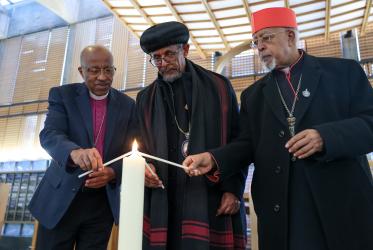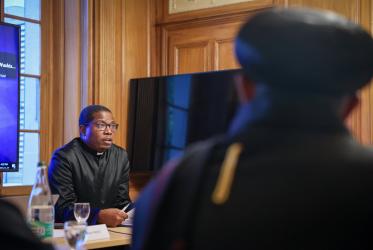Written statement at the UN Commission on Human Rights' 62nd Session, Item 9,
13 March-21 April, 2006
Mr Chairman,
This statement is being submitted by the Commission of the Churches on
International Affairs (CCIA) of the World Council of Churches (WCC)
1. The United Nations Human Rights Commission has, over the years, provided
a forum for the exposure of gross and systematic violations of human
rights around the world. It has extended the provisions of the technical
services, established new international standards and elaborated new enforcement
mechanisms. The CCIA has played a significant role in these developments.
It has urged governments to ratify the Conventions, supported
UN efforts to eliminate racism and contributed to the development of standards
such as the Convention on the Elimination of all Forms of Discrimination
Against Women, the Declaration on Religious Intolerance, Convention on
Torture and other Cruel Inhuman and Degrading Treatment or Punishment
and further worked for the protection of Rights of Human Rights Defenders.
2. The CCIA believes that the task of upholding human rights is based on
the Christian conviction that God wills a society in which all can exercise
full human rights. All human beings are created in the image of God, equal
and infinitely precious in God's sight. The CCIA reiterates that it is the
right and duty of the international community to hold all state and nonstate
actors accountable for violation of human rights which occur within
their jurisdiction or control or for which they are directly responsible. Since
the 1975 WCC Assembly in Nairobi, the CCIA has viewed forced disappearances
as a crime against humanity which affects not only individual
persons but entire families. When family members are abducted, the hid-
ing of information about the fate of the disappeared is a cause of major pain
and suffering to the victims' near and dear. Affected families have the right
to know the truth and to demand from civil authorities, armed forces and
police personnel as to who is responsible for such ghastly actions. The fear
when people disappear or their whereabouts are unknown normally is that
they have been kidnapped and/or have become victims of extra-judicial
killings.
3. The CCIA is concerned about the growing culture of impunity that is now
prevalent in many countries. The security officials and those responsible
for law enforcement are often not reprimanded and punished for the abuse
of power and authority vested in them by the state. Lack of accountability
by the state for such heinous crimes is directly responsible for nurturing
a climate of impunity. This culture of impunity is growing in many
parts of the world and is a major factor responsible for continued deterioration
in the human rights situation. In such situation abuses and violations
take place without perpetrators being brought to justice. This lack
of action on the part of governments and state authorities not to hold security
personnel who commit such human rights abuses accountable creates
fear and despondency amongst the public and is an encouragement to
impunity. The issue of impunity has ethical, theological, social and political
implications. It has to be taken seriously not only by governments but
also civil society movements as well as religious organizations.
4. The Ethiopian Human Rights Council (EHRCO) is a long-standing partner
of CCIA, the two have worked in close cooperation on issues of justice,
peace and human rights not only in Ethiopia but also in the African region
as well. The CCIA since the May 2005 elections has monitored the situation
in Ethiopia and has received regular reports of human rights violations.
The Ethiopian Human Rights Council has consistently urged the
government to take immediate steps to stop these human rights violations
including the killings, illegal detentions, beatings, torture and harassment
being committed by various organs of the state. Such an action on part of
the government will help to bring an end to unrest and thus hopefully the
problems created in the country by mass unrest can be resolved in an amicable
and legal manner. The Ethiopian Human Rights Council has also
called on the government and the opposition parties to conduct their affairs
within the framework of law and adopt peaceful means for resolving their
disagreements. However, despite these appeals the conditions in Ethiopia
have continued to deteriorate with the government's arrest of top leadership
of the opposition political parties.
5. Since the third week of September 2005 the Ethiopian government's security
forces, members of the police force and the Kebele militia-men have
detained and forcefully kidnapped, beaten, tortured, and inflicted severe
bodily harm against members and supporters of the opposition Coalition
for Unity and Democracy (CUD) and the United Ethiopian Democratic
Forces (UEDF). According to the information provided to EHRCO by
CUD it is clear that since the trouble began in May 2005 more than 1,250
of its members were put under detention in different regions; and twelve
of its offices were closed down. The Coalition parties request to organize
peaceful rallies was turned down by the authorities. Not only the opposition
parties, but others too have been treated harshly by the government.
There have been numerous complaints by the Ethiopian Teachers Association
that their members are being illegally detained and harassed. The names
of some of those illegally detained include: Teferi Gessese, the General
Secretary of the Addis Ababa Teachers' Association; Kassahun Kebede,
President of the Addis Ababa Teachers' Association; Tamrat Tesfaye, member
of the Executive Committee of the Addis Ababa Teachers' Association,
and a host of others. The list of such detentions runs into thousands and
has been well documented by EHRCO. All these actions are indicative of
the fact that the government is not prepared to enter into a dialogue with
the opposition. It appears to be bent on resolving a political dispute through
military action.
6. The government is continuing presently with its high-handed tactics and
taking recourse to illegal actions and indulging in brutal treatment of
opposition party leaders and supporters as a matter of routine. This is done
on a regular basis particularly in rural areas. It has used the pretext of terrorism
and the armed insurgency in the vast Oromia region to justify torture
and illegal detentions in order to silence dissidents and those opposed
to the regime. Hundreds of students have been arrested since the May 2005
protests began. Heavy penalties are selectively imposed against the Oromia
people and restrictions placed on their movements, making it difficult for
them to pursue their livelihood.
7. In November 2005, the General Secretary of the World Council of Churches
visited Ethiopia. He had amongst others a meeting with the President of
Ethiopia, Meles Zenawi. During the meeting the General Secretary expressed
his concern at the growing tension between the government and the opposition
political parties in the aftermath of the general election. He requested
President Meles that the dispute with the opposition be resolved through
dialogue and that the government should exercise moderation, patience
and tolerance in dealing with the opposition political parties. It should as
well explore all avenues for a peaceful resolution of the crisis. Subsequent
to his meeting with President Meles, the General Secretary of WCC also
met with key leaders of CUD and UEDF and repeated his plea for a dialogue
in the long-term interest of the Ethiopian people. Regrettably, despite
these appeals, following demonstrations and riots in Addis Ababa, hundreds
of people were injured and some were killed. The key opposition
leaders were placed under detention. The WCC called upon the govern-
ment of Ethiopia to refrain from any further military action as this would
result in escalation of violence likely to further damage the political climate
and make dialogue even less possible.
8. On 24th November 2005 the General Secretary of the World Council of
Churches wrote to Her Excellency Ms Louise Arbour, the United Nations
High Commissioner for Human Rights, expressing concern at the continued
detention of the leaders of opposition political parties including Dr Mesfin
Woldemariam who has been suffering ill health since August 2005 and is in
urgent need of medical care and attention. Dr Mesfin is a well-known human
rights defender and founding member and former chair of EHRCO.
It is accordingly submitted that UNCHR should call on the government of
Ethiopia to:
Release all political prisoners including Dr Mesfin; while in detention he
should be provided with adequate medical care and attention;
take immediate steps to engage the leaders of the opposition political parties
in dialogue in order to create a conducive environment for a government
of national unity so that peace, democracy and human rights can be
restored;
guarantee freedom of the press and ensure that civil society organizations
are allowed to carry on their tasks without hindrances;
facilitate the visit of a UN Special Rapporteur to Ethiopia in order to monitor
the critical human rights situation.




